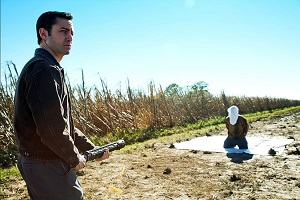
Logic is never kind to a story about time travel. It seems that no matter what idea or aspect of so-called fourth dimensional travel a storyteller wishes to pursue, something does not work right — contradictions abound. The biggest plot holes in the history of fiction are to be found therein. For my money, this is the first and best reason to suppose that time travel is not possible. Reality is nothing if not possible and plausible — at least from the perspective of one in possession of the relevant facts — and if a story cannot be made to work right when time travel is involved, reality probably cannot either.
There is, however, a lot of potential in such tales. If a viewer will but suspend his disbelief and allow an author or filmmaker to explore one possibility while forgetting its necessary and contradictory corollaries, then some interesting possibilities may be realized. Rian Johnson has done a first-rate job of spinning a time-traveling yarn with the new movie Looper, if the audience will afford it such consideration.
The year is 2044, and time travel, as we are told by the narrator and protagonist (played by Joseph Gordon-Levitt), is not yet invented. Thirty years in the future, it is/will be (it occurs to me that we need another tense or two in the English language when we discuss these things). It is illegal, though, and only mobsters make use of it, to send back their targets to be eliminated and their bodies disposed of. The men who do the eliminating and disposing are called loopers, and they earn that appellation when they close their own loop by, at the end of their contract, killing their 30-years-older selves.
Our protagonist, called simply Joe, is a drug abusing, well-dressed looper with a manner perhaps a bit too refined, and a face perhaps too smooth and handsome, for someone in his station. Leonardo DiCaprio, in The Departed, managed to overcome his golden beauty and give a convincing portrayal of a hoodlum. I would have preferred something rougher like that in Looper. Gordon-Levitt has all the makings of a leading man, but I thought the role he portrayed in this film was not quite the right one.
Nevertheless, Johnson and Gordon-Levitt manage to fashion a three-dimensional character out of Joe, and he is not the only one. It is impressive how many roles in this movie are handled with enough care to make them feel like real people, even a few with minimal screen time. For that alone the movie rises above the mediocre majority.
One day, inevitably, Joe comes face to face with his future self, sent back in time. There is something different, though. Future Joe is not bound at the wrists with his head in a white sack as all the others are, and in surprise Present Joe hesitates, allowing Future Joe to escape. Failure to dispose of a mark is not looked upon kindly in the underworld of this never-named Midwestern city, so Present Joe tries to hunt down his future self to save his present self. Meanwhile, his future self is on a mission to kill a child before he can turn into a man and do terrible things decades hence, but he does not know which of three children he must kill.
The story comprises a lot more than what is detailed here, but the above suffices to give a basic idea. To tell any more would spoil the surprise. I will just say that it all leads to a very satisfying conclusion, one you can see coming if you are paying attention and thinking about the possibilities, but the foresight does not make it a disappointment. Instead, the suspicion of what is coming and the step-by-step approach to getting there heighten the anticipation.
Along with The Gray, I found Looper to be the best movie I have seen this year, and there are a number of things I could point to. The characterizations and the inspired idea I have already mentioned; there are more noteworthy features.

The world is well-crafted, mixing the old and familiar with the new and improved. The same process of new technology overlapping but not immediately replacing older versions is a constant, and there is no reason to think that 2044 will be any different. The sets capture this perfectly. I particularly liked the juxtaposition of the mundane with the fictional and fantastic. Sometimes we cut from a run-down apartment to a futuristic skyline at night; other times we see an advanced city in the background while corn stalks sway in the breeze in the foreground. A new contraption that dusts crops comes out of a dilapidated old barn that is probably old right now in 2012. While it hovers over the corn, a farmer cuts into a tree stump with her ax and rubs her skin raw.
With characters so well-drawn and a world so well-envisioned, even a middling plot would satisfy, but Looper is a cut above the average, storywise. It is a tale that takes us through many interactions and many phases, covers much territory with a host of emotional highs and lows. While never forgetting its original conceit, it ventures far into new territory, finally becoming a tale about many things, but all in the right balance. The director takes advantage of the unique situation of having different temporal versions of the same man interacting with each other. What happens to the younger version must affect the older version, and a couple inspired scenes play with this idea.
There are a lot of details in the movie that at first seem to serve no purpose, but in the end they all come into play. There is a metaphor about small and large spiders, which gives a clue about events yet to transpire. An offhand comment from a prostitute gives us information that will later be important. A mutant psychic power, for the longest time, seems like a whimsical addition to the world, but proves to be vital to the resolution. Everything is there for a reason, even if it does not come out right away.
Finally, I would note the camerawork. Director Rian Johnson makes use of what is off camera as much as what is on camera, and he always seems to nail it. Some shots are effective because they are simple, like the opening shot, while others achieve a harmonious complexity that delights the eyes.
There is very little to quibble about. The protagonist might not be the most believable in his situation, and Emily Blunt’s Sara is also not quite right for a former street walker turned mother and farmer. Even forgetting the illogic involved with time travel, we have to wonder why targets in the future are not killed in the future and merely disposed of in the past. For a profession like loopers with a demonstrated high time preference, one wonders how Joe, a drug addict, resists the temptation to spend and winds up saving so much money. The imperfections in this gem are few and small.
The trend continues with movies. We must wait for the latter part of a year to get most of our good ones. This makes for a depressing drought for a few months, but the end of the year always holds promise. Looper, let us hope, is just the vanguard.















